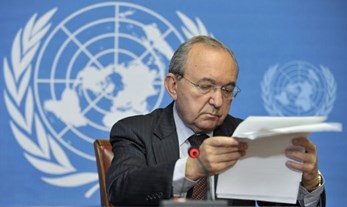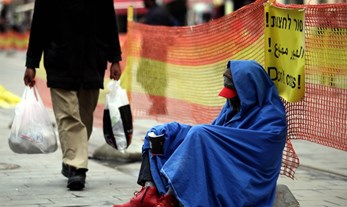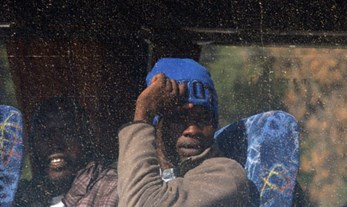


The Quality of Independence
Written By: Prof. Yedidia Z. Stern
In an op-ed from Yedioth Ahronoth written in honor of Israel's 63rd Independence Day, IDI Vice President of Research Yedidia Z. Stern reflects on the quality of Israeli independence, and asserts that a connection with the wellsprings of Jewish culture is necessary for maintaining the quality of the independence that Israel holds so dear.

A Memory and its Lessons
Written By: Dr. Arye Carmon
In an op-ed originally published in the Globes financial daily, IDI Former President and Founder Dr. Arye Carmon recalls attending the trial of Adolf Eichmann as a teenager in Jerusalem and reflects on the meaning of the Holocaust for Israelis in 2011.

Conference Rationale
Written By: Karmit Haber
IDI's international conference "What Do Think Tanks Do?," conducted in May 2011, focused on the role and nature of think tanks in the democratic context. In this article, Dr. Karmit Haber explains the rationale behind the conference and examines the primary roles of think tanks and how they approach a variety of issues.

A Suggested Moral Analysis of the Goldstone Report and its Aftermath
Written By: Prof. Mordechai Kremnitzer
Prof. Mordechai Kremnitzer, IDI Vice President of Research, analyzes fundamental principles that bear crucially on the moral aspects of the Goldstone Report, Israel's stance with respect to the report, and contemporary international criminal law in general.

The Israeli Voters Have Spoken
A survey conducted in April 2011 by IDI’s Guttman Center and the Dahaf Institute on behalf of the Save Israeli Democracy NGO reveals that Israeli voters are fed up with political parties and Knesset members, but are willing to support initiatives that will change the situation.

The Constitution Doesn't Mention Czars
Written By: The Honorable George P. Shultz
In an op-ed from the Wall Street Journal, Former American Secretary of State George P. Shultz, Chairman of IDI's International Advisory Council, contemplates Washington's mounting practice of appointing White House "czars"—staff members who have de facto decision-making power over all major areas of government—and discusses what must be done to reverse this trend.

The Goldstone Retraction: Better Late than Never, and an Opportunity to Reconsider
Written By: Prof. Yuval Shany
Judge Richard Goldstone’s retraction of his commission's finding that Israeli actions in Gaza during Operation Cast Lead deliberately targeted civilians righted a historical injustice. But did the actions of the State of Israel contribute to the false impression received by the Goldstone Commission? In this op-ed, IDI Senior Fellow Prof. Yuval Shany explores the question of whether the Israeli government should also search its soul and consider participation in future international commissions of inquiry.

IDI President Dr. Arye Carmon on the Forum for Political Reform
Written By: Dr. Arye Carmon
In 2009, IDI Former President and Founder Dr. Arye Carmon established The Forum for Political Reform in Israel in response to "the urgent need to generate significant improvement in the capabilities and functioning of the Knesset." On March 28, 2011, Forum Chairman Meir Shamgar, Former President of the Israeli Supreme Court, submitted the Forum's recommendations to the Knesset. In this video interview, Dr. Carmon speaks about the Forum, its key recommendations, and obstacles to political reform in Israel.

It isn't for the State to Promote Arab-Jewish Coexistence
Written By: Yair Sheleg
In an op-ed from <em>Haaretz</em>, IDI Research Fellow Yair Sheleg responds to the law allowing admissions committees in small community settlements to bar new residents who do not suit the “lifestyle and social fabric” of the community.

The Nakba Bill: A Test of the Democratic Nature of the Jewish and Democratic State
Written By: Prof. Mordechai Kremnitzer, Dr. Amir Fuchs
The “Nakba Bill” would impose financial sanctions on institutions that commemorate Israel’s Independence Day as a day of mourning. In this op-ed from the Ynet website, IDI’s Prof. Mordechai Kremnitzer and Adv. Amir Fuchs warned that while observing Israel’s Independence Day as a day of mourning by citizens of the State of Israel is “a galling, unpleasant, and defiant act,” the test of a true democracy is whether it is able to allow such expressions of freedom of speech.

Zionism Must Reject Ultra-Orthodox View on Conversion
Written By: Yair Sheleg
In this op-ed from Haaretz, IDI Research Fellow Yair Sheleg decries the ultra-Orthodox refusal to alter standards for conversion to Judaism in recognition of the fact that for many Israelis, Jewish identity is not only an expression of religious observance but also of identification with Zionism and Jewish culture. He warns that the ultra-Orthodox approach is causing serious injustice to thousands of people who wish to live as Jews and raise Jewish children in Israel.

Religious Incitement: A Test Case for Freedom of Speech?
Written By: Prof. Yedidia Z. Stern
In an op-ed in Yedioth Ahronoth, IDI Vice President Yedidia Z. Stern responds to the proposed "Dov Lior Bill" and decries the possibility that members of the clergy—of any religion—be above the law and immune from prosecution for incitement to violence when their religious teachings may encourage criminal behavior.

Some Comments on the Situation in Egypt
Written By: Dr. Jesse Ferris
Dr. Jesse Ferris, IDI Vice President of Strategy, reflects on the arrival of the Arab Spring in Cairo and makes a preliminary assessment of its origins and implications for Egypt.

Israel’s Stability Fetish
Written By: Dr. Jesse Ferris
Dr. Jesse Ferris places the upheavals in Egypt in historical perspective and argues that Israel should not be so quick to dismiss the chance, however slim, of more open government for its Arab neighbors.

Robinson Crusoe, Just Distribution, and the Image of God
Written By: Prof. Shahar Lifshitz
On January 5-6, 2011, IDI convened a Conference on People with Disabilities in the Jewish and Democratic State, as part of the activities of IDI's Judaism and Human Rights project. IDI Senior Fellow Prof. Shahar Lifshitz, the project's co-director, shares his thoughts on social justice and the just distribution of resources.

Time to Step Up for Democracy
Written By: Dr. Arye Carmon, Prof. Yedidia Z. Stern, Prof. Mordechai Kremnitzer
A number of controversial bills recently tabled in the Knesset undermine basic constitutional values, add fuel to the international assault on Israel's legitimacy, and may end up damaging Israel's democratic character. In an article in The Jerusalem Post, IDI Former President and Founder Dr. Arye Carmon and Vice Presidents Professors Mordechai Kremnitzer and Yedidia Z. Stern respond to these initiatives.

A Matter of Definition: On ‘Infiltrators’ and ‘Asylum Seekers’ in Israel
Written By: Prof. Reuven (Ruvi) Ziegler
In this article, IDI Researcher Adv. Reuven (Ruvi) Ziegler surveys Israel's regulations regarding refugees and asylum seekers and points to three areas—eligibility for asylum, the rights of asylum seekers, and detention—in which they are incompatible with the UN refugee convention.

Clear-Cut Racism or Complicated Relationship?
Written By: Yair Sheleg
Are the ostensibly anti-Arab bills under consideration by the Knesset, the “Rabbis’ Letter” that forbids the sale of real estate to non-Jews, and the findings of the 2010 Israeli Democracy Index clear-cut indicators that racism is on the rise in Israel today? Or are more complex factors at play? IDI Research Fellow Yair Sheleg shares his views on this matter.

The "Rabbis' Letter" and Halakhah
Written By: Dr. Eliezer Hadad
The "Rabbis' Letter" signed by dozens of community rabbis in Israel in December 2010 asserts that Jewish law forbids the rental and sale of homes in Israel to non-Jews. Is renting property to non-Jews indeed forbidden by Jewish law? IDI Researcher Dr. Eliezer Hadad surveys opinions by contemporary rabbis who adopted a universalistic approach and found a halakhic basis for the equal rights mandated by both international norms and the Israeli Declaration of Independence.

The Road to Fascist Hell
Written By: Yair Sheleg
Is Israel in a similar situation as the Weimar Republic after World War I—on the road to a fascist, racist regime? In this article, IDI Research Fellow Yair Sheleg asserts that alongside the dangerous statements of the Israeli right, the extreme left's attempts to delegitimize Israel and its army, as well as its sweeping characterization of any initiative that seeks to strengthen Israel's security or Jewish identity as racist, are dangerous as well. He concludes that it's not enough to combat anti-democratic terrorism; the exploitation of democracy that feeds it must be combated as well.

The Syrian Temptation
Written By: Dr. Jesse Ferris
Should Israel be actively pursuing peace with Syria? Dr. Jesse Ferris critiques the Israeli establishment’s fixation on the possibility of peace with the current regime in Syria.

Israeli McCarthyism?
Written By: Prof. Mordechai Kremnitzer, Shiri Krebs
In this op-ed article, IDI Vice President of Research Prof. Mordechai Kremnitzer and IDI researcher Adv. Shiri Krebs question the wisdom of forming a parliamentary commission of inquiry into the funding of Israeli human rights organizations. They warn against a slippery slope to McCarthyism and point out that the establishment of the commission, far from strengthening Israel’s legitimacy, will accelerate efforts to delegitimize Israel and prosecute Israeli officials overseas.

Israel, A Unique Nation in the MidEast
Written By: Vernon Bogdanor
How should Israelis feel about the Katzav verdict? In this article from <em>The Jewish Chronicle</em>, Prof. Vernon Bogdanor of King's College in London, a member of IDI's International Advisory Council, asserts that the outcome of the trial can be a source of pride, since the mark of a constitutional democracy is that no one is above the law. At the same time, however, he warns that Israel needs to develop a culture of self-criticism in light of recent trends in attitudes towards the Arab minority.

The Limits of Party and Coalition Discipline
Written By: Reuven Rivlin
How much parliamentary independence should Knesset members have? To what extent must they toe their party's line? At a time when party discipline and coalitional discipline play a decisive role in determining the fate of Israeli policy and proposed legislation, MK Reuven (Ruby) Rivlin, Speaker of the Knesset, calls on parties to allow Knesset members to remain true to their conscience and to their role as representatives of the people.

Who is Entitled?
Written By: Aryeh Eldad
The question of who is a citizen of Israel is tied to many issues in the forefront of debate in Israel: questions regarding the Jewish and democratic nature of the state, questions regarding conversion, and questions regarding the absorption of refugees and foreign workers into Israeli society. In this article, guest columnist MK Aryeh Eldad shares his views on who is entitled to be and who should be a citizen of the State of Israel.

The Founding Vision: Israel as a Democratic State. Period.
Written By: Shulamit Aloni
The question of who is a citizen of Israel is tied to many issues in the forefront of debate in Israel. In this article, guest columnist Former MK Shulamit Aloni focuses on the democratic nature of the State of Israel, and particularly the concept of equality, as the foundation on which citizenship rests, and decries recent racist undercurrents observed in Israeli society, which she sees as contrary to the founding vision of the State.

Mr. Prime Minister, Douse the Flames of Racism
Written By: Prof. Mordechai Kremnitzer, Dr. Amir Fuchs
In an op-ed from <em>Haaretz</em>, IDI Vice President of Research Prof. Mordechai Kremnitzer and Researcher Adv. Amir Fuchs assert that Prime Minister Netanyahu was right to condemn a letter by rabbis forbidding the rental of property in Israel to Arabs, and call on him to prevent the passage of a bill that would allow small Jewish communities to exclude Arabs from living in their midst.

An analysis of the proposed comprehensive counter-terrorism bill that was prepared by IDI's Terrorism and Democracy research team and submitted to the Ministry of Justice.
Written By: Prof. Yedidia Z. Stern
In an op-ed in Yedioth Ahronoth, IDI Vice President of Research Prof. Yedidia Z. Stern urges the Israeli government to fend off political pressure, act morally, and assert that anyone who has converted to Judaism in the Israel Defense Forces is a Jew.

IDI Denounces Rabbis' Petition against Rental to Arabs
On December 7, 2010, Rabbi Shmuel Eliyahu, Chief Rabbi of Tzfat, and 49 other municipal rabbis in Israel issued a letter ruling that Jewish law forbids the sale or rental of property in Israel to gentiles. IDI joined the voices that condemned this letter.

MK Amsellem's Daring
Written By: Yair Sheleg
In an op-ed for <em>Haaretz</em>, IDI Research Fellow Yair Sheleg analyzes the behavior of renegade MK Rabbi Chaim Amsellem of Shas in its broader socio-religious context. Could Amsellem be a harbinger of a new renaissance in Jewish law, or is he an exception that does not point to a trend?

